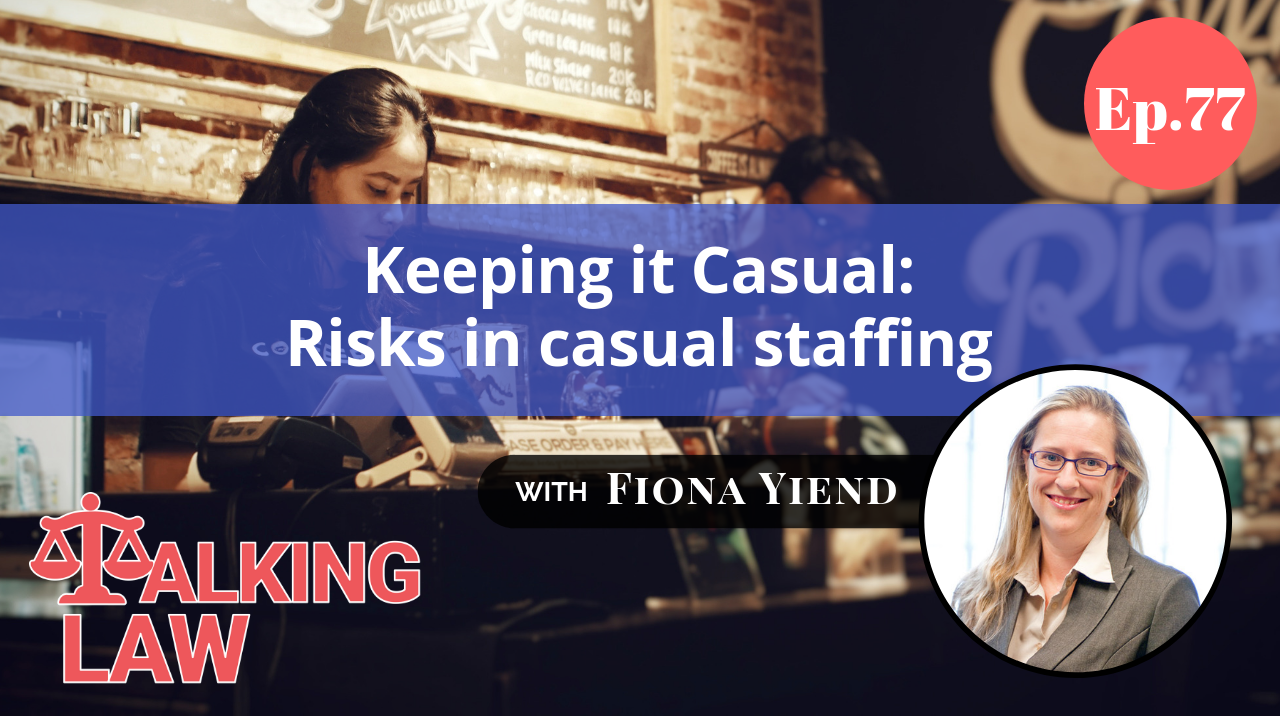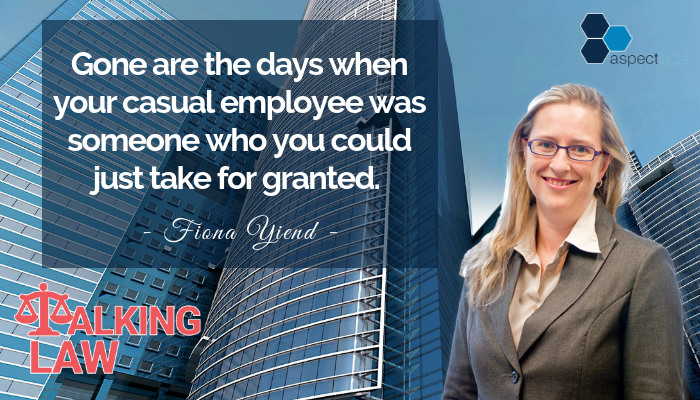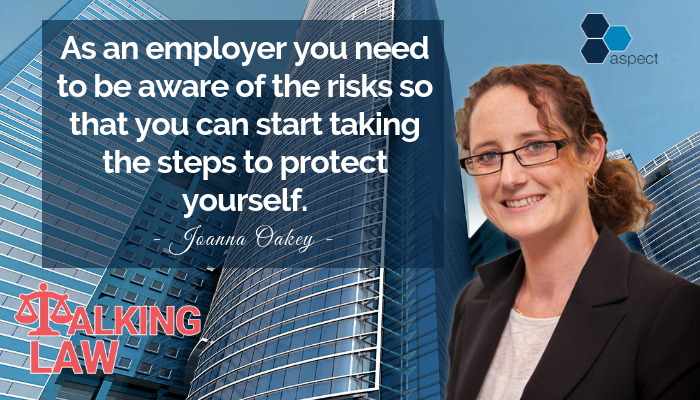
Do you have casual employees? This episode talks about the risks of casual staffing and gives guidance on how to protect yourself as an employer.

Episode Highlights:
- Casual employees and their entitlements
- What happened in WorkPac and Skene
- What employers need to do
- Impact of the regulation change and new legislation
- Important action tips
Joanna: Hi, it’s Joanna Oakey here and welcome back to Talking Law. Now in today’s episode we’re going to get a little bit serious. We’re going to be talking about some brand new legislation and some recent case law.
Yes, I can hear you all shuddering. Case law sounds really boring, but we’ll try to make it very interesting. But I want to talk about some really important changes that have come in very recently in relation to dealing with your casual workforce.
Now today to talk about this issue we’ve brought in the fabulous Fiona Yiend from our very own Aspect Legal, who is here to give us the nitty gritty on what the hell is happening in this area.
Fiona, thank you for coming on board!
Fiona: Thank you very much.
Joanna: Great. Okay. So why don’t we kick it off Fiona by maybe just giving our listeners a really quick overview of what the issue is in this area. What are the changes? Why are we talking about it I guess?
Fiona: Okay, thanks Joanna. The issues in this area relate to the question of what’s an employee who’s casual and what are their entitlements. So it’s an age old problem, when are your employees casual and where are you not.
The courts over time have set up lots of different things to decide if someone is a genuine casual employee. Once again it’s reared its ugly head and we’re talking about it because some of the laws have now changed as a result of a recent decision.
So to put it in perspective, the real issue for employers is if you have someone who is a casual employee and they’re deemed to be a permanent employee you have to start paying them for things like annual leave, long service leave, personal leave and additional entitlements, which casuals are normally given a casual loading to compensate them for not having.
So the problem for employers is you can get hit twice and have double dipping if you’re not careful.
Joanna: So I think I just want to emphasize that because this is the real issue and I just want to make sure that our listeners are aware of this for their businesses or indeed if you are an adviser to businesses on behalf of your clients who really may not be aware of the changes and the issues that have now been brought to the forefront. The risk is that if you’re engaged in casual work staff, they might be deemed to be a permanent staff and you may have to effectively double pay. So the casual loading plus back pay for entitlements that they’ve missed out.

Now maybe if we can demonstrate how this happened and just to be clear there’s two things that we’re going to talk about today. Number one there’s a change in legislation which came into effect on the 1st of January this year. So really new legislation would talk about what that legislation means in a moment.
But there’s also separately a case that came through the courts towards the end of last year. So last year we’re talking about 2018, depending on when you’re listening to this podcast. A case that came through the courts in late 2018 that has really really sent I think shock waves through you know certainly advisors like us and it should send shock waves through businesses that have a casual workforce.
So let’s talk about this case Fiona, WorkPac and Skene. What happened? What was that all about?
Fiona: Okay. This guy called Paul Skene. He was a haul truck operator who was engaged on a casual basis, fly in fly out, into the coal mines, working with his roster 12 months in advance.
He basically took up a job. He was employed as a casual. He was given a rate, which was set out as a rate. It was fifty dollars an hour to be exact, and he was employed on a casual basis. He was told that he had casual loading.
When he completed his job, he terminated his employment naturally just like you or I might when we resign. But he argued that he was really a permanent employee and was entitled to include entitlements for annual labor as part of his termination pay.
Fiona: So this was picked up by one of the unions that ran with it and the court ultimately decided that because he had a range of indicia, which is you know things that they looked to say if he was a casual or not, that he was not a casual employee and was a permanent employee.
Now most people who have had to deal with employees and casual employees will know that they look at a range of different things. In this example, they found that the certainty of Paul’s engagement, the regularity and the predictability of his work hours meant that was really inconsistent with being a casual.
Joanna: And I guess if we sort of step that out a bit more, I guess what we’re saying is in this particular instance because they had him rostered 12 months in advance, it wasn’t really casual. So that’s the argument that they were running and the court sort of agreed at the end of the day.
Fiona: They did. The problem with this decision is not that he was actually deemed to be a permanent employee rather than a casual. It’s actually the fact that the employer got stung twice, because what happened is the court went a step further.
After he was found to be a permanent employee, so they said okay he’s entitled to all of his accrued entitlements. Normally, you would say okay that’s fine. We’ve been paying you a loaded rate which means we’ve been paying you more than we would pay our normal permanent employees. We can set off those payments to make sure that you get the right sum at the end of the day.
However, in this case the court said because the rate did not expressly state a percentage or an amount that responded to the casual loading amount. Rather, it was just a rate that included loading. It wasn’t able to determine what was the additional payments and therefore they couldn’t set it off and the company had to pay the entitlements as well.
This guy got both payments.
Joanna: Wow. When I first saw this case, I thought wow this is huge and I think as it rolls through, it is even getting bigger in terms of our understanding of how it might impact businesses who have casual employees.
Fiona: And that’s correct Jo, because unusually for the law it’s actually moved relatively quickly. People have been quite concerned about these changes and there has been a regulation that’s been passed to try and give guidance on how to protect yourself as an employer.
The key thing is if you’re an employer you need to look at your casual contracts to make sure you don’t get hit with the double dipping. We can’t control where the courts will go on a casual vs. permanent employee at times. But you can protect yourself by looking at your contracts and drafting them very carefully.
Joanna:Yeah, okay. I think that’s such an important point. I guess what we’re saying here is not well here’s this big risk. I think what we’re saying is there’s steps that you can now take and you really as an employer need to be aware of the risks so that you can start taking the steps to protect yourself. There’s things you can be doing.
Fiona: Yes.

Joanna: Let’s talk about the impact then in the regulation change and then in the new legislation as well. If you can tell us what’s happening in that area at the moment.
Fiona: Okay. So again, this casual area has been quite exciting for the end of 2018, which is very rare for you to say as a lawyer. But the government did do a regulation under the Fair Work Act which does address some of these concerns about this double dipping, which does give sensible employers a way to protect themselves from that double dipping that we were just talking about.
Conversely though, at the same time there was put in place starting 1 January 2019, some amendments to the awards which mean that all employees now have actually more certainty at times and if you feel some criteria can become permanent employees by their choice. And that’s something that we now need to be aware of.
Gone are the days when your casual employee was someone who you could just take for granted to be honest, and used as you wished for. Their rights are increasing and employers need to be very aware of their needs.
I don’t know about you, but when I was a casual, performance management wasn’t really there. These days it’s something that employers are going to need to start to protect themselves because they’re going to get caught with some employees they may not want.
Joanna: Yeah. I think that’s interesting as well, because as as you said this is a really fast moving space so we’ve probably not seen the end of the evolution of this space as well. I guess it’s about our listeners getting on top of the situation right now., But also staying tuned and having the right contacts so that they know as this continues to evolve.
Fiona: If you were giving your casual every Sunday for ever. Get them off. Get them out of being a casual. Make them a part timer. Pay them less money or variants. Be aware of it because you will get caught.
Most places have the Sunday afternoon guy who’s been there forever. He does the same thing, and then the next thing you know you’re suddenly required to give them annual leave and they’ve been there for five years. That’s a lot of annual leave.
Joanna: Okay look. Thanks Fiona. I think that’s a really good overview and I think look there’s probably a lot more that both of us have to say about this area, but I don’t really want to over complicate it right at this point. Because I really want this message to get through to employers loud and clear.
I think most businesses have either had casual workforce at some point or have it right now. So I think this is such important information for employers as a whole, that it’s really important that they’re understanding what we’re saying here. That if you’ve got a casual workforce, you’ve got to get on top of this now.
So let’s go through maybe the action steps for any of our listeners who are employers of a casual workforce. I guess the first point is to have someone review your situation and explain how this impacts your business and what changes need to be made. I think that’s the first thing. What’s your thoughts Fiona? What else should they be looking at?
Fiona: Yes, I do think that’s the first thing to do. They need to understand where they’re at currently.
But the other thing I do think they need to do after that is they need to get their casual employment contracts reviewed.
It’s fundamental. They need to get that sorted out so that they know that they’ve got what they need to be covered off in eventualities that could arise.

Joanna: Yeah, absolutely. Absolutely.
It’s probably a good point to get your employment documents as a whole review, but certainly your casual employment documents.
I guess the last element really is making sure you’re embedding new practices and procedures to help you minimise the risks. Because it’s not just about understanding the risks and then having your employment contracts reflect the best minimisation process.
It’s also about having your processes reflect, correctly reflect what your employment contracts say and what union processes should be.
Fiona: Very much so. In employment, that’s fundamental. Because they always look through to the reality. They look to the real circumstances. The courts do. They don’t look at what your documents say. They try and look to see what you actually do. So it’s making sure you up to that.
Joanna: Excellent. Okay, well look Fiona thank you so much for coming on to the podcast today and talking about this really important area.
If you as a listener are concerned about your business or businesses that you’re an advisor of, I recommend that you get in touch. We’ll put some details in our show notes of how you can do that or just pop straight over to our website at www.aspectlegal.com.au and there you can choose a 15 minute free consultation. We can have a discussion with you or with your clients about how this legislation and new cases might impact their business.
Fiona, thank you so much for coming on Talking Law. It’s been a pleasure having you.
Fiona: Thank you very much. It’s been lovely.
Need legal assistance in dealing with casual staff?
Do you or your clients need assistance in getting on top of the changes in dealing with casuals?
If so, Aspect Legal is here to help with a number of different simple options we have available to help businesses navigate this area with ease.
If you are interested, head over to bit.ly/casualstaffing where you can line up a free call with our specialist team who can explain what the changes might mean for you or your clients and what protections can be implemented immediately or check out the show notes where we will link straight through to that free call booking engine.
Disclaimer: The material contained on this website is provided for general information purposes only and does not constitute legal advice. You should not depend upon any information appearing on this website without seeking legal advice. We do not guarantee that the contents of this website will be accurate, complete or up-to-date. Liability limited by a scheme approved under Professional Standards Legislation.














